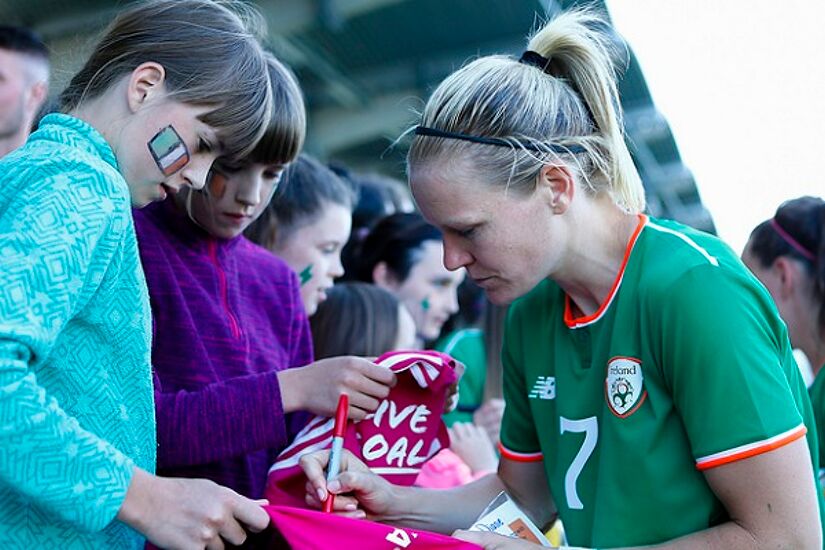Opinion: Without solidarity we have no future - we need to back women's sport

Credit: Peter Fitzpatrick (ETPhotos)
It's been a depressing week for women's sport in Ireland.
While Kellie Harrington, Michaela Walsh and Gráinne Walsh represented their country with distinction in boxing at the European Championship in Bulgaria, taking home two bronze medals, the picture elsewhere has been markedly different.
As the men's rugby team – by far the wealthiest domestic sports team on this island – were losing to Australia in Brisbane, their female counterparts were left wondering what might have been.
Thanks to the news media, they found out an invitation to tour Australia – what would have been their first ever tour anywhere – had been refused on their behalf by the IRFU for reasons not explained.
Few doubt those reasons were financial, despite the fact the Australian rugby union had agreed to pay for all but their flights over.
It seems Irish rugby can front up tens of thousands for the likes of Joe Tomane to play for Leinster Rugby, but a tour that could advance the women's game isn't worth a fraction of the same cost.
Three days later, the Irish football team's World Cup dream came to an end with a battling 1-0 defeat to Norway in Stavanger.
They performed admirably, but they did so with one hand tied their back, as five of the 11 players who started – and all three introduced subs – are amateur athletes
By contrast, all 14 of Norway's players were full professionals, and nine of those who took the field were based in their home country.
That game was broadcast live by RTÉ, but the previous Friday's meeting between the sides in Tallaght wasn't aired on Irish TV.
It was scheduled for 5.30pm, making it inaccessible for most working people, many outside Dublin and the schoolchidren who make the matchday atmosphere so vibrant.
What binds both the women's rugby and football teams is that they've had to fight for parity of esteem with their male counterparts – not for equal resources, mind, but for the basic provision of resources with which to do their job.
For the Irish football team, it culminated in a threat to strike before a 2017 friendly with Slovakia if they were not provided with such basic facilities as compensation for work missed and tracksuits they could wear out of the airport.
The rugby team have long suffered from unequal treatment to their male counterparts: while the men travel first class to every game, women have been booked on economy flights, often with several connecting flights to save costs.
Before a crucial Six Nations game in France in 2012 – a tournament they could have won – the Irish team were presented a 27-hour itinerary and arrived at 7am on the morning of the game, which they lost by a point.
For professional athletes, it would be considered unconscionable – for amateur athletes, representing their country for two of the three wealthiest sporting bodies on this island, it's a straightforward insult.
Our men's teams would not put up with such constraints, but in Ireland women's games are second-class sports and are treated accordingly by the men who hold power.
In both cases above, the women involved stood up and did what they've conditioned not to do, and demanded the basic conditions that are standard for men on this island and for women in countries like Norway.
The FAI will launch the under-17s national league for girls in July, which is a welcome and far-thinking development, but already there's concern for an organisation that struggles to field match officials at boys' underage level – and that's before the under-13 league kicks off.
There have been undeniably positive developments for the women's game on the media and promotions end.
Aviva and Three have thrown their weight behind the national team, while the arrival of Kieran Crowley as FAI communication executive has coincided with an increased focus on women's football.
Videos have been produced with men's elite players voicing their support for the women's team, while in the Women's National League top-class reporters like Paul Buttner at Peamount United have increased the standard of reporting via official channels.
And in a country where the men's League of Ireland lags so far behind equal-sized nations on the continent, the plight of women's football can seem trivial to some.
More is needed, however, if we're to become a country that treats our sportswomen with the same reverence and the same respect with which we treat our sportsmen.
One incident following the international in Tallaght stood out.
Ireland striker Stephanie Roche, who had been working for Aviva at the game while injured, filed out the players' exit after talking to the media.
Seeing the large crowd of adoring adults and children, mainly children, who were waiting over an hour after the full-time whistle, she did a double take. Even for a star of Irish football, the scale of the support momentarily took her aback.
But while the attendance that saw watched Ireland face Norway in Tallaght marginally eclipsed that of the game in Stavanger, the treatment of the two teams is markedly in contrasted.
Late last year, Norway's female and male players signed a deal that would see both teams paid equally for representing the national team. A similar deal in New Zealand was agreed.
Such foresight appears a million miles away in Irish sport, but until governing bodies recognise the equal value of women's sport we have no scope to progress. Without solidarity, we have no future.

